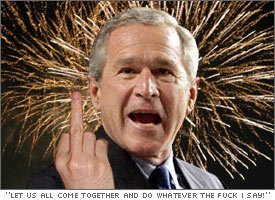
There's a realization going around Washington these days. It goes something like this: If an administration gets elected by saying government is bad, it follows that they will appoint people who don't care about governing. Hurricane Katrina demostrated this in spades last year. But two stories this week illustrate just how endemic, and costly, this anti-government problem is at a strategic level.
The first story this week was the announcement by the United Arab Emirates that they would shift 10 percent of their foreign exchange reserves from dollars to Euros. In real terms, this move alone will not seriously impact the value of the dollar, but it's symbolic significance is great. That's because the UAE's move represents more than just retribution for the horrible way in which U.S. politicians distorted the issue. Simply the fact that it is happening represents a real move away from the dollar by a major energy player. When South Korea, a major holder of foreign exchange, made some similar diversification noises a year ago, the news roiled the markets.
The UAE move is a direct result of the Bush administration's lack of concern about governing the nation. A responsible executive would have placed port security at the top of its priority list in the wake of 9/11. Instead, the Bush administration spent most of its energy on building the case for invading Iraq while its homeland security agenda amounted to a massive and innefectual restructuring of the bureaucracy. In turn, the overly-politicized Department of Homeland Security spent most of its money on red-state pork instead of securing our vulnerable blue-state ports.
The fear of the Arab world sown by the Bush administration and the derrogation of duty in regards to port security combined into a perfect storm called Dubai Ports World. Faced with a misled and insecure nation and an opposition party convinced that to fight the Rove/DeLay/Abramoff corruption ring they had to be like them, the outcome of this episode was mostly pre-ordained.
The second story is the revelation of Don Rumsfeld's ideological intervention in the Iraq war planning. Writing in the New York Times, Michael Gordon and retired General Bernard Trainor excerpted a powerful article from their newly-released book, Cobra II: The Inside Story of the Invasion and Occupation of Iraq. Speaking on last night's Charlie Rose program on PBS, Gordon and Trainor said that Bush, Cheney and Rumsfeld believed that "America doesn't do nationbuilding" and believed that their understanding of the Iraqi order of battle was so complete that a the war would be "a cake-walk."
They were wrong, of course. Not only did the administration seem to believe its self-fabricated intelligence about Iraq's non-existent weapons of mass destruction, Gordon and Trainor have exposed the fact that Rumsfeld and his regional commander, General Tommy Franks, could not or would not integrate contradictory intelligence coming from the battlefield. That intelligence, of course was that the Iraqi battle plan relied more on the irregular fedayeen paramilitaries to prosecute a dispersed insurgency than on conventional forces fighting a defensive, traditional war. That the White House could not admit that its WMD intel was wrong has, of course, been well documented in the Plame affair.
In both cases, the Bush administration's incompetence and short-cutting proved the decisive factors. That attitude belies their well-established disdain for government and, by extention, for the welfare of the majority of the American people. And for that incompetence America is now paying an obscenely high price in terms of blood and treasure.


No comments:
Post a Comment